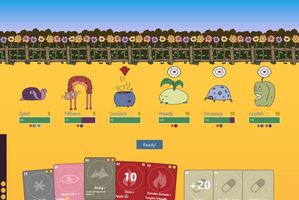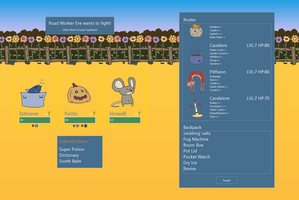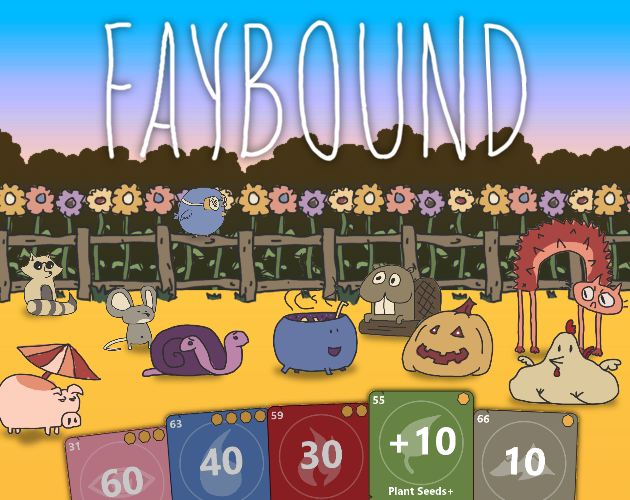Faybound - The Start of a New Journey


Faybound is a card-driven party-based RPG, where you capture creatures and battle other creature coaches. You can play the Ludum Dare version now (and please do if you are participating!), but that was the first draft of an idea. It has promising qualities, but the final version is likely to be very different.

The first step towards that final version is to nail down the core gameplay systems. The current core game loop basically works like this:
- Each player selects 3 creatures to field, and up to three item cards.
- Each of which has a deck of 5 cards. These are shuffled* into a deck of 15 cards per player (item cards are left separate).
- Battle begins.
- Start of turn: Players reset resources and draw** five cards. The amount of which increases each turn.
- Action Phase: Player selects a card tied to one of their creatures, and selects a target for that card, if applicable
- The selected card goes into a queue.
- Players can continue playing cards in the action phase or cancel a previously queued card.
- Once happy with the queue, they click ready.
- Both players reveal all the cards selected to each other.
- All the cards from both players are resolved in order***.
- Players discard any leftover cards.
- Turns continue until all creatures for one player are defeated.
*Secretly, the game finds the first card in the deck that costs 1 resource or less and moves it into the first hand of each player. This way the payer generally has an action available on the first turn.
**If the deck is empty, the discard pile is shuffled into the deck.
***The cards from both players are combined and sorted by initiative (top left corner). These run left -> right, using the targets selected earlier.

This effectively makes the game a programming game, in the board game sense. You set up actions, and then see how they play out when unknown variables are introduced. Here, if the Bubble card confuses the owner of one of the later cards, that card might fail to play. If the creature being targeted for healing by the last action has fainted by the time that card plays, the card will fizzle out.
That all seems quite complicated written out, but in play the game flows quite quickly. Playing a card takes one click to select, and usually a second click to select a target. You click once when ready, and again after seeing what your opponent played.
This system has a number of advantages:
- Player turns move quickly and there are few interruptions or blocks to the flow.
- The user micro-actions are simple. Just select a card and a target.
- An increasing resource pool is well understood, and ramps into more exciting turns.
- The queue allows for experimentation, as you can cancel out and try a different mix of effects easily.
However, there are also a number of disadvantages:
- It is difficult to play well. There is a lot of hidden information, and you can only vaguely guess at what might happen.
- Turns can have a huge variance. You might play a single big attack, and the opponent randomly stuns that creature instead of another one, preventing your big attack from playing. That turn can go from wiping out all three opponents to being totally wiped out yourself.
- On the flip side, you can use an effect to stun an enemy creature, and then find out that your opponent didn't play any cards for that creature. Similarly, you could set up a defense for one creature and then have them not be attacked at all.
- Early in battle, there are few real choices. You likely only have one card you can play on turn 1, and it probably isn't very high impact.
- Late in battle, there are also few real choices. You can often play all the cards you want to, and who to target with each card is frequently obvious.
- With hands resetting each turn, it is difficult to plan ahead. You could theoretically have an idea of the cards in your deck, but there are too many variables to really set up for something specific on future turns.
It is easy to highlight the flaws, but this is not a bad system. Many of the disadvantages outlined above could maybe be mitigated with small-ish tweaks. However, now is the perfect time to explore alternative core rules. In the next dev log, we will start to explore some of these bigger alternatives.
Files
Get Faybound
Faybound
Assemble a team of creatures fight in card-based RPG combat
| Status | Prototype |
| Author | Mercury Wave |
| Genre | Role Playing, Card Game |
| Tags | Ludum Dare 52, Roguelike, Turn-based |
More posts
- Faybound - KeywordsJan 29, 2023
- Faybound - Evolving Core Card PlayJan 22, 2023
Leave a comment
Log in with itch.io to leave a comment.